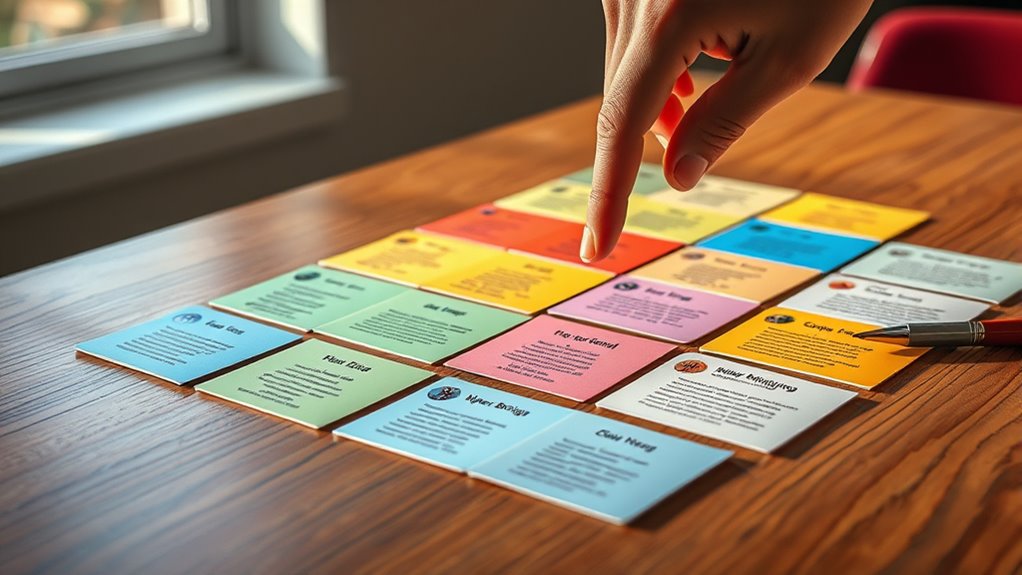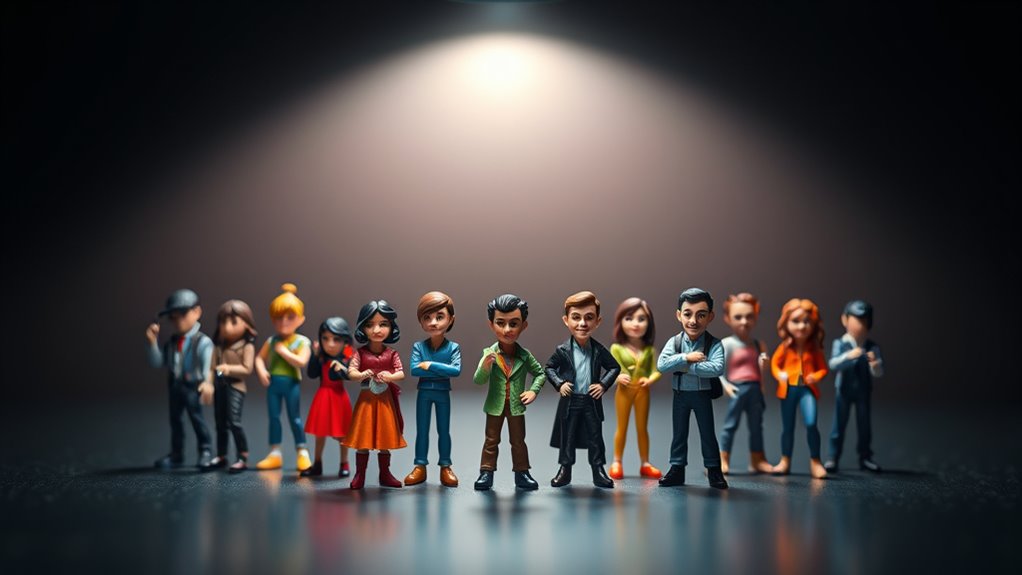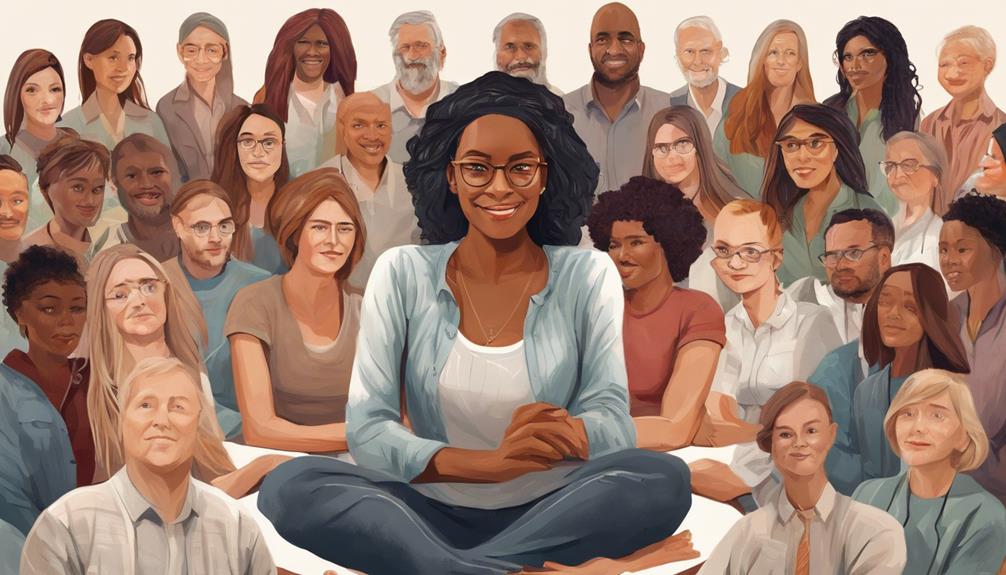Understanding the 16 Myers-Briggs personality types helps you discover how you perceive the world, make decisions, and connect with others. Each type combines preferences across four key dimensions, revealing your unique strengths and tendencies. Knowing your type can guide you in choosing careers, improving relationships, and boosting personal growth. If you’re curious about how these types influence your life, exploring further will uncover even more insights into yourself and those around you.
Key Takeaways
- The 16 Myers-Briggs types are based on four dimensions: sensing vs. intuition, and thinking vs. feeling.
- Each type combines preferences, such as ISTJ, ENFP, or INTP, representing unique personality profiles.
- Understanding these types helps improve self-awareness, relationships, and career alignment.
- Types are categorized into four groups: Analysts, Diplomats, Sentinels, and Explorers.
- Exploring all 16 types reveals diverse ways individuals perceive the world and make decisions.

The Myers-Briggs Personality Types offer a practical way to understand yourself and others by categorizing preferences across four key dimensions. This framework helps you see how people approach life, work, and relationships differently. When you recognize these differences, you can better navigate relationship dynamics, understanding why certain interactions feel effortless or challenging. For example, if you’re an extrovert, you might seek social engagement, while an introvert prefers quiet reflection. Knowing your type and others’ can improve communication and reduce misunderstandings. It also guides you in choosing careers that align with your natural preferences, increasing job satisfaction and performance. If you’re someone who values structure and order, a career in administration or finance might suit you. Conversely, if you thrive on creativity and spontaneity, roles in design or marketing could be more fulfilling. The key is that each type has strengths that make them well-suited for specific environments and tasks.
Understanding the dimensions—such as sensing versus intuition or thinking versus feeling—helps you grasp your own decision-making style and how you relate to colleagues and partners. For instance, sensing types prefer concrete facts, which can be advantageous in detail-oriented jobs, while intuitive types excel at seeing the big picture, making them effective strategists. When you’re aware of these traits, you can tailor your approach to work collaboratively with others, respecting their preferences and building more harmonious relationships. This insight extends to personal relationships, where understanding your partner’s type can lead to greater empathy and patience. Recognizing that a feeling type values emotional harmony and a thinking type prioritizes logic helps you communicate more effectively and avoid unnecessary conflicts. Additionally, exploring self-awareness through personality insights can deepen your understanding of your motivations and behaviors, fostering personal growth.
Moreover, knowing your Myers-Briggs type can give you confidence in your career choices, helping you identify roles that naturally align with your skills and interests. If you’re an introverted thinker, roles in research or data analysis might be more satisfying than highly social or collaborative positions. For extroverted feelers, careers that involve helping others or engaging with groups, like counseling or teaching, could be more fulfilling. This clarity allows you to focus on environments where you’re likely to thrive, ultimately leading to greater success and happiness. By exploring Myers-Briggs personality types, you gain valuable insights into how your preferences shape your interactions and career path. This awareness can improve your personal relationships, foster better teamwork, and help you pursue roles that match your natural inclinations, making your life more balanced and rewarding.
Frequently Asked Questions
Can Myers-Briggs Types Predict Career Success?
Your Myers-Briggs personality assessment can give you insights into your strengths and preferences, but it doesn’t predict career success. While certain types may find better career compatibility with specific roles, success depends on your skills, experience, and effort. Use the personality assessment as a tool to understand yourself better, guiding your career choices, but remember that persistence and growth play bigger roles in achieving success.
Are Myers-Briggs Types Scientifically Validated?
Think of Myers-Briggs types as colorful maps guiding your personality journey, but they lack solid footing. Scientifically, they don’t have strong psychometric validity, meaning their reliability is shaky, and they often face scientific criticism. You should view them more as a helpful sketch rather than a precise blueprint. While fun to explore, don’t rely on Myers-Briggs types as definitive or scientifically validated tools for understanding yourself or others.
How Often Do Personality Types Change Over Time?
Personality types can change over time, but generally, personality stability is common, especially in adulthood. Your type might experience some evolution due to life experiences, personal growth, or changing circumstances, but these shifts are usually subtle. Significant type evolution is rare. You should expect some degree of personality stability, yet remain open to minor changes that reflect your ongoing development and new insights.
Can I Change My Myers-Briggs Type?
Yes, you can change your Myers-Briggs type, but it’s uncommon. Personality stability varies, and your type might shift due to life experiences, growth, or new perspectives. Type transformation is possible as you develop different traits or adapt to new environments. Keep in mind, your core personality tends to remain consistent, but you can influence how you express it over time, leading to a different MBTI classification.
How Do Myers-Briggs Types Influence Relationships?
You may find that Myers-Briggs types substantially influence your relationships, as studies show 76% of couples with similar types report higher satisfaction. Your type shapes your communication styles and emotional compatibility, affecting how you connect and resolve conflicts. Understanding these differences helps you navigate relationships more effectively, fostering empathy and patience. Recognizing your partner’s type allows you to adapt your approach, strengthening your bond and building a deeper, more harmonious connection.
Conclusion
Now that you’ve explored all 16 Myers-Briggs personality types, do you see how understanding these differences can help you connect better with others? Recognizing your own type and those around you can improve communication, empathy, and teamwork. So, are you ready to embrace your unique traits and use this knowledge to build stronger relationships? Remember, everyone’s personality adds something special to the mix—so why not start exploring yours today?









